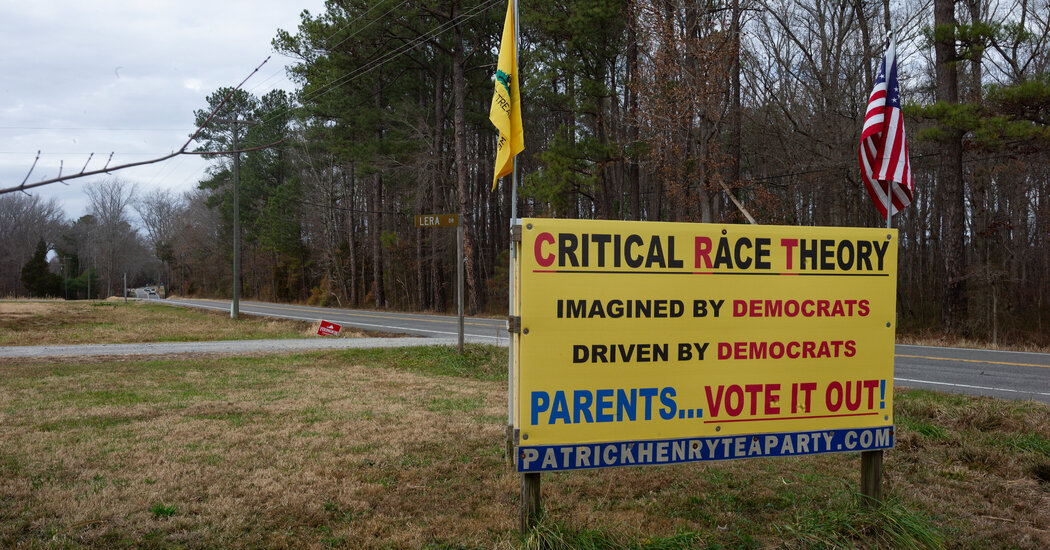A Republican legislator in Virginia who campaigned against critical race theory introduced a bill that incorrectly said the Lincoln-Douglas debates were between Abraham Lincoln and Frederick Douglass.
Amid a flurry of bills nationwide that seek to ban the teaching of critical race theory in schools, one such proposal in Virginia stood out.
Tucked inside a bill introduced by Wren Williams, a Republican delegate, was a glaring error: Among the concepts that school boards would be required to ensure students understood was “the first debate between Abraham Lincoln and Frederick Douglass.”
But as scholars, Mr. Williams’s colleagues in the House of Delegates and others on social media noted, that debate was between not Lincoln and Frederick Douglass, the abolitionist, but Lincoln and Stephen Douglas, a Democratic senator from Illinois.
“The gross mistake in this bill is indicative of the need to have scholars and teachers, not legislators/politicians, shaping what students at every level learn in the classroom,” Caroline Janney, a professor of Civil War history at the University of Virginia in Charlottesville, said in an email.
On Friday, Addison Merryman, a spokesman for Mr. Williams, released a statement from the state’s Division of Legislative Services, which took the blame for the error.
The mistake was inserted at the “drafting level following receipt of a historically accurate request from the office of Delegate Wren Williams,” according to the division, which described itself as a nonpartisan state agency that drafts, edits and releases “thousands of legislative drafts” for the General Assembly each session.
Mr. Merryman did not respond to additional questions about whether a historian had been consulted on the legislation or about concerns that the proposal could run afoul of the First Amendment. (Parts of that bill, such as a section that tells school boards not to “teach or incorporate into any course or class any divisive concept,” have been criticized as overly broad and likely to infringe on the free speech of students and educators.)
Instead, he referred to statements that he and Mr. Williams had made on Townhall, a conservative website. Mr. Merryman told Townhall that Mr. Williams had submitted an “anti-discrimination bill” that correctly referred to the Lincoln-Douglas debates.
Lincoln and Douglas met seven times in 1858, when Lincoln, a Republican, challenged Douglas for Senate. Lincoln lost the election, but the debates between the two brilliant orators transfixed the country, drew attention to the bitter arguments over slavery and catapulted Lincoln to national fame.
Mr. Williams told Townhall that he was “frustrated” by the error.
“I have a very high standard for my office, and my service to my constituents and the Commonwealth,” he said.
“I trust this was an honest mistake,” he added, “and I don’t hold it against Legislative Services.”
The mix-up recalled remarks by President Donald J. Trump on the first day of Black History Month in 2017 in which he referred to Douglass in the present tense, leading some critics to conclude that he believed the abolitionist, who died in 1895, was still alive.
“Frederick Douglass is an example of somebody who’s done an amazing job and is being recognized more and more, I notice,” he said.
The error should not distract the public from the general contents of the bill, which would keep conversations about the United States’ racial history out of classrooms, said Lara Schwartz, a professor of government in the School of Public Affairs at American University in Washington.
“If this so-called divisive concepts bill became law, all of Virginia’s students would be the worse for it, and ignorance of our history would not just be a sad punchline — it would become more the norm,” she said in an email.
Critical race theory — an advanced academic concept generally not introduced until college — is not part of classroom teaching in Virginia. But during the statewide race last year, Mr. Williams, 33, a lawyer who worked on Mr. Trump’s failed efforts to overturn the election results in Wisconsin, said he would ban it in schools if he won.
He won the Republican nomination last June, unseating Charles Poindexter, a longtime legislator in the district, and then won 77 percent of the vote in the November general election, beating Bridgette Craighead, a Democrat.
The bill, the first one introduced by Mr. Williams, is pending in committee and must be passed by both the House of Delegates and the Senate, where Democrats hold a slim majority.
Understand the Debate Over Critical Race Theory
An expansive academic framework. Critical race theory, or C.R.T, argues that historical patterns of racism are ingrained in law and other modern institutions. The theory says that racism is a systemic problem, not only a matter of individual bigotry.
The legislation would forbid school boards or educators to teach “any divisive concept,” encourage students to participate in political activism or “public policy advocacy,” or hire equity and diversity consultants.
The legislation’s wording “prohibits teachers from helping students understand the continuing role of racism in the development of American institutions and culture,” said James Grossman, the executive director of the American Historical Association, which represents more than 11,500 historians. “It provides a chilling effect that makes teachers wary of teaching accurate American history.”
He said the bill had come from the same template as legislation introduced in more than 30 other states that seeks to ban or limit the teaching of “divisive concepts” relating to race and racism in classrooms.
Professor Schwartz said that “the fact that there is a basic factual error in this bill has amused many people.”
She added, “But it’s a distraction from an issue that’s not funny at all: a wave of state legislation that has the effect and intent of impeding the important conversations that teachers and students need to have in their classrooms.”


























